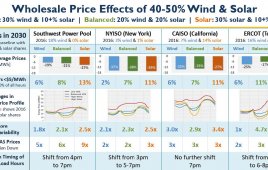Intriguing and thought-provoking, a recent study conducted by researchers at the esteemed University of California, Berkeley delves into the profound consequences that high-variable renewable energy futures may have on our society. With an unwavering commitment to scientific rigor and meticulous analysis, this groundbreaking research sheds light on a topic that has long been shrouded in uncertainty.
An In-Depth Analysis Unveiling New Perspectives
The study embarks upon an in-depth exploration of the implications associated with high-variable renewable energy futures. Employing cutting-edge methodologies and sophisticated modeling techniques, the researchers meticulously assess how these scenarios can impact various aspects of our lives – from economic stability to environmental sustainability.
This comprehensive investigation reveals that while transitioning towards a high-variable renewable energy future holds immense potential for reducing greenhouse gas emissions and mitigating climate change, it also presents formidable challenges. The intermittent nature of renewables necessitates innovative solutions to ensure grid reliability and resilience.
Furthermore, this study uncovers crucial insights regarding market dynamics within such a scenario. By examining electricity prices under different conditions, it becomes evident that achieving cost-effectiveness requires careful consideration of factors like storage technologies, demand response mechanisms, and interconnection infrastructure.
Safeguarding Grid Stability through Technological Advancements
A key finding from this research underscores the paramount importance of technological advancements in maintaining grid stability amidst high variability in renewable energy generation. Advanced forecasting models coupled with intelligent control systems emerge as indispensable tools for optimizing resource allocation and minimizing disruptions caused by fluctuations in supply.
Moreover, integrating emerging technologies such as artificial intelligence (AI) algorithms enables real-time decision-making processes that enhance system flexibility while ensuring reliable power delivery throughout diverse weather conditions or unforeseen events.
Policy Recommendations for a Sustainable Energy Transition
The Berkeley study concludes with a set of policy recommendations aimed at facilitating the transition towards high-variable renewable energy futures. These proposals emphasize the need for robust regulatory frameworks that incentivize innovation, encourage investment in research and development, and foster collaboration between public and private entities.
Furthermore, it highlights the significance of international cooperation to address cross-border challenges associated with renewable energy integration. By fostering knowledge exchange and harmonizing standards, countries can collectively navigate the complexities of transitioning to sustainable energy systems.
A Glimpse into an Exciting Future
In conclusion, this groundbreaking Berkeley study provides invaluable insights into the implications of high-variable renewable energy futures. As we strive towards a more sustainable future, understanding these potential impacts is crucial for informed decision-making processes. With continued research efforts and collaborative endeavors across disciplines, we can pave the way for a greener world powered by clean and resilient sources of energy.




